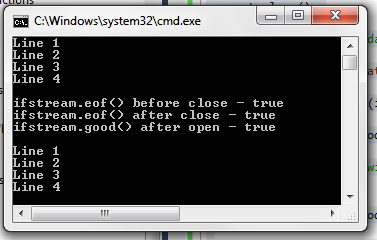Николай Йосуттис говорит в своей книге, что функция open member не очищает флаги состояния. Это не то, что я нашел в VS2010. Это проблема MS?
Николай Йосуттис на странице 547 своей книги «Стандартная библиотека C ++» говорит следующее в отношении приведенного ниже кода:
Note that after the processing of a file, clear() must be called to clear the state flags that are set at end-of-file. This is required because the stream object is used for multiple files. The member function open() does not clear the state flags. open() never clears any state flags. Thus, if a stream was not in a good state, after closing and reopening it you still have to call clear() to get to a good state. This is also the case, if you open a different file.
// header files for file I/O
#include <fstream>
#include <iostream>
using namespace std;
/* for all file names passed as command-line arguments
* - open, print contents, and close file
*/
int main (int argc, char* argv[])
{
ifstream file;
// for all command-line arguments
for (int i=1; i<argc; ++i) {
// open file
file.open(argv[i]);
// write file contents to cout
char c;
while (file.get(c)) {
cout.put(c);
}
// clear eofbit and failbit set due to end-of-file
file.clear();
// close file
file.close();
}
}
Мой код ниже работает без проблем в VS2010. Обратите внимание, что после создания файла «data.txt» он читается дважды без очистки флагов входного потока.
#include <iostream>
#include <fstream>
#include <string>
int main()
{
// Create file "data.txt" for writing, write 4 lines into the file and close the file.
std::ofstream out("data.txt");
out << "Line 1" << '\n' << "Line 2" << '\n' << "Line 3" << '\n' << "Line 4" << '\n';
out.close();
// Open the file "data.txt" for reading and write file contents to cout
std::ifstream in("data.txt");
std::string s;
while( std::getline(in, s) ) std::cout << s << '\n';
std::cout << '\n';
std::cout << std::boolalpha << "ifstream.eof() before close - " << in.eof() << '\n';
// Close the file without clearing its flags
in.close();
std::cout << std::boolalpha << "ifstream.eof() after close - " << in.eof() << '\n';
// Open the file "data.txt" again for reading
in.open("data.txt");
std::cout << std::boolalpha << "ifstream.good() after open - " << in.good() << '\n';
std::cout << '\n';
// Read and print the file contents
while( std::getline(in, s) ) std::cout << s << '\n';
std::cout << '\n';
}
Ouput

Решение
Это было изменено для C ++ 11. Правило C ++ 98 (как правильно описано Йосуттисом) было явно неверным, поэтому я не удивлюсь, если реализации не соблюдают его.
Другие решения
Других решений пока нет …
